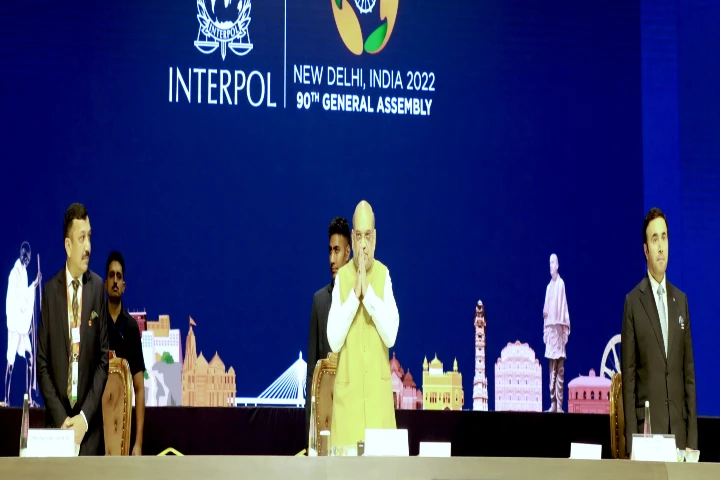

Home Minister Amit Shah speaks at the Interpol conclave in New Delhi
The issue of terrorism and its deep links with Pakistan is back in the strategic discourse again. The primary reason: the state that uses terrorism as an instrument of state policy is no longer in the ‘grey list’ of the Financial Action Task Force (FATF).
On October 20-21, a plenary meeting of the FATF was held. As Pakistan has shown “significant progress” by improving Anti-Money Laundering/Combating the Financing of Terrorism regime, it is no longer in the grey list of the terror watchdog. But how credible and irreversible are Pakistani actions?
FATF believes that Pakistan has “strengthened the effectiveness of its AML/CFT regime” and has “addressed technical deficiencies to meet the commitments of its action plans” that were identified in June 2018 and June 2021. Pakistan was so keen to get out of the FATF ‘grey list’ that it completed the commitments outlined in June 2021 “in advance of the deadlines, encompassing 34 action items in total”.
The removal from the FATF ‘grey list’ is a shot in the arm for Pakistan. As per a Reuters report, by the removal from FATF list, Pakistan would “get a clean bill of health from the international community on terrorist financing. It would also improve sentiment” which is “important from a foreign direct investment perspective”.
The domestic and international context behind Pakistan’s removal from the FATF list is worth examining. Pakistan has seen a change of government earlier this year and the cricketer-turned-politician Imran Khan is no longer at the helm. The new administration led by Shehbaz Sharif has made visible efforts to rebuild the US-Pakistan relationship that was strained during the tenure of Khan.
The Sharif government may also have either supported or turned a blind eye towards the US’ covert activities in Afghanistan. It is widely believed that without some form of cooperation from the Pakistani establishment, the US would not have been able to kill Ayman al-Zawahiri in Kabul. Despite the tensions between some factions of the Taliban and Pakistan, the role of Pakistan remains critical in Afghanistan.
The context of the Ukraine-Russia war and the position of India is also of note here. Despite the Western pressure, India has continued to purchase Russian oil and has refused to condemn the Russian invasion of Ukraine. Irked by India’s firm stand, the West has begun to re-engage with Pakistan, partly in recognition of Pakistan’s own geostrategic importance but also to send a message to India.
The US’ willingness to provide a $ 450-million assistance package to Pakistan for maintaining the F-16s is probably a sign of things to come. Meanwhile, the US ambassador to Pakistan Donald Blome visited Pakistan-occupied Kashmir. These are well-calculated moves and the US knew that they would not go down well in Delhi.
The removal of Pakistan from the FATF is a signal. Pakistan is back in the reckoning. India has no option but to deal with the evolving strategic context. The opening of channels of communication with the Taliban and deploying a technical team in Kabul were important steps. India will have to do more to ensure a sustained presence in Afghanistan and find ways to put the pressure back on Islamabad.
While the FATF plenary was going on, India was playing host to the 90th General Assembly of the Interpol. As Pakistan’s removal from the FATF grey list was on the cards, India decided to go on the offensive on the question of terrorism. India’s Home Minister Shah addressed the concluding session of the Assembly. His speech mentioned the word “terrorism” as many as 15 times.
He called for agreeing “on the definition of terrorism and terrorist”. In a clear reference to Pakistan, Shah argued for achieving “a consensus on the cross-border propagation of terrorist ideologies through online radicalization”. He was clear that, “we cannot consider this a political problem. We must all be committed to ensuring that an effective fight against terrorism should be long term, comprehensive and sustainable”.
The speech noted that India is working with the Interpol “to fight all forms of terrorism such as narco-terror, online radicalization, organized syndicates and money laundering”. If one is to read the “political” message underlying this address, it was aimed at Pakistan. References like “cross-border propagation of ideologies” and “money laundering” indicate this point very clearly.
For now, Pakistan is out of the FATF grey list and finds itself in a relatively favourable geopolitical setting. For India, targeted killings in Kashmir and the likely return of political process to the Union Territory will present new security challenges, emboldened Pakistan, being, probably, the most important one. India has no option but to prepare to meet the interconnected challenges of Kashmir, terrorism and Pakistan.
Also Read: After FATF decision, India wants Pakistan to continue action against terror
Taiwan's Armed Forces staged a powerful demonstration of military readiness on Saturday, simulating a Chinese…
In a significant milestone for global healthcare innovation, the World Health Organization (WHO) has released…
The Balochistan Liberation Front (BLF) has claimed responsibility for a sweeping wave of armed assaults…
Union Minister of State for External Affairs Pabitra Margherita reaffirmed the "strong and enduring bonds…
Prime Minister Narendra Modi on Saturday distributed over 51,000 appointment letters to newly appointed youth…
Union Health Minister and BJP National President JP Nadda engaged with the Chairman of the…